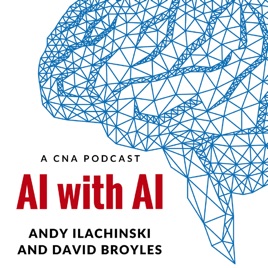
Advertise on podcast: AI with AI: Artificial Intelligence with Andy Ilachinski
Rating
5 from
Country
This podcast has
101 episodes
Language
Publisher
Explicit
No
Date created
2017/12/04
Average duration
39 min.
Release period
14 days
Description
AI with AI explores the latest breakthroughs in artificial intelligence and autonomy, and discusses the technological and military implications. Join Andy Ilachinski and David Broyles as they explain the latest developments in this rapidly evolving field. The views expressed here are those of the commentators and do not necessarily reflect the views of CNA or any of its sponsors.
Social media
Check AI with AI: Artificial Intelligence with Andy Ilachinski social media presence
Podcast episodes
Check latest episodes from AI with AI: Artificial Intelligence with Andy Ilachinski podcast
RAI, consumers’ co-operative
2022/06/17
CNA colleagues Kaia Haney and Heather Roff join Andy and Dave to discuss Responsible AI. They discuss the recent Inclusive National Security seminar on AI and National Security: Gender, Race, and Algorithms. The keynote speaker, Elizabeth Adams spoke on the challenges that society faces in integrating AI technologies in an inclusive fashion, and she identified ways in which consumers of AI-enabled products can ask questions and engage on the topic of inclusivity and bias. The group also discusses a variety of topics around the many challenges that organizations face in operationalizing these ideas, including a revisit of the findings from recent medical research, which found an algorithm was able to identify the race of a subject from x-rays and CAT scans, even with identifying features removed.
Inclusive National Security Series: AI and National Security: Gender, Race and Algorithms
Inclusive National Security webpage
Sign up for the InclusiveNatSec mailing list here.
more
Top Gan: Swarmaverick
2022/06/03
Andy and Dave discuss the latest in AI news and research, starting with an announcement that DoD will be updating its Directive 3000.09 on “Autonomous Weapons,” with the new Emerging Capabilities Policy Office leading the way [1:25]. The DoD names Diane Staheli as the new chief for Responsible AI [5:19]. NATO launches an AI strategic initiative, Horizon Scanning, to better understand AI and its potential military implications [6:31]. China unveils an autonomous drone carrier ship even though Dave wonders about the use of the terms unmanned and autonomous [8:59]. Stanford University and the Human-Centered AI Center build on their initiative for foundation models by releasing a call to the community for developing norms on the release of foundation models [10:42]. DECIDE-AI continues to develop its reporting guidelines for early-stage clinical evaluation of AI decision support systems [14:39]. The Army successfully demonstrates four waves of seven drones, launched by a single operator, during EDGE 22 [18:31]. Researchers from Zhejiang University and Hong Kong University of S&T demonstrate a swarm of physical micro flying robots, fully autonomous, able to navigate and communicate as a swarm, with fully onboard perception, localization, and control [19:58]. Google Research introduces a new text-to-image generator, Imagen, which uses diffusion models to increase the size and photorealism of an image [24:20]. Researchers discover that an AI algorithm can identify race from X-ray and CT images, even when correcting for variations such as body-mass index but can’t explain why or how [31:21]. And Sonantic uses AI to create the voice lines for Val Kilmer in the new movie Top Gun: Maverick [34:18].
RSVP for AI and National Security: Gender, Race, and Algorithms at 12:00 pm on June 7.
more
El Gato Altinteligento
2022/05/20
Andy and Dave discuss the latest in AI news and research, starting with the European Parliament adopting the final recommendations of the Special Committee on AI in a Digital Age (AIDA), finding that the EU should not always regulate AI as a technology, but use intervention proportionate to the type of risk, among other recommendations [1:31]. Synchron enrolled the first patient in the U.S. clinical trial of its brain-computer interface, Stentrode, which does not require drilling into the skull or open brain surgery; it is, at present, the only company to receive FDA approval to conduct clinical trials of a permanently implanted BCI [4:14]. MetaAI releases its 175B parameter transformer for open use, Open Pre-trained Transformers (OPT), to include the codebase used to train and deploy the model, and their logbook of issues and challenges [6:25]. In research, DeepMind introduces Gato, a “single generalist agent,” which with a single set of weights, is able to complete over 600 tasks, including chatting, playing Atari games, captioning images, and stacking blocks with a robotic arm; one DeepMind scientist used the results to claim that “the game is over” and it’s all about scale now, to which others that using massive amounts of data as a substitute for intelligence is perhaps “alt intelligence [8:48].” In the opinion essay of the week, Steve Johnson pens “AI is mastering language, should we trust what it says [18:07]?” Daedalus’s Spring 2022 issue focuses on AI and Society, with nearly 400 pages and over 25 essays on a variety of AI-related topics [19:06]. And finally, Professor Ido Kanter from Bar-Ilan University joins to discuss his latest neuroscience research, which suggests a new model for how neurons learn, using dendritic branches [20:48].
RSVP for AI and National Security: Gender, Race, and Algorithms at 12:00 pm on June 7.
Apply: Sr. Research Specialist (Artificial Intelligence Research) - ESDA Division
Further Reading
more
Leggo my Stego!
2022/05/06
Andy and Dave discuss the latest in AI news and search, including a report from the Government Accountability Office, recommending that the Department of Defense should improve its AI strategies and other AI-related guidance [1:25]. Another GAO report finds that the Navy should improve its approach to uncrewed maritime systems, particularly in its lack of accounting for the full costs to develop and operate such systems, but also recommends the Navy establish an “entity” with oversight for the portfolio [4:01]. The Army is set to launch a swarm of 30 small drones during the 2022 Experimental Demonstration Gateway Exercise (EDGE 22), which will be the largest group of air-launched effects the Army has tested [5:55]. DoD announces its new Chief Digital and AI Officer, Dr. Craig Martell, former head of machine learning for Lyft, and the Naval Postgraduate School [7:47]. And the National Geospatial-Intelligence Agency (NGA) takes over operational control of Project Maven’s GEOINT AI services [9:55]. Researchers from Princeton and the University of Chicago create a deep learning model of “superficial face judgments,” that is, how humans judge impressions of what people are like, based on their faces; the researchers note that their dataset deliberately reflects bias [12:05]. And researchers from MIT, Cornell, Google, and Microsoft present a new method for completely unsupervised label assignments to images, with STEGO (self-supervised transformer with energy-based graph optimization), allowing the algorithm to find consistent groupings of labels in a largely automated fashion [18:35]. And elicit.org provides a “research discovery” tool, leveraging GPT-3 to provide insights and ideas to research topics [24:24].
Careers: https://us61e2.dayforcehcm.com/CandidatePortal/en-US/CNA/Posting/View/1624
“RSVP for AI and National Security: Gender, Race, and Algorithms at 12:00 pm EST on June 7th at https://www.eventbrite.com/e/ai-and-national-security-gender-race-and-algorithms-tickets-332642301077?aff=Podcast.”
more
The Amulet of NeRFdor
2022/04/22
Andy and Dave discuss the latest in AI news and research, including a proposal from the Ada Lovelace Institute with 18 recommendations to strengthen the EU AI Act. [0:57] NVidia updates its Neural Radiance Fields to Instant NeRF, which can reconstruct a 3D scene from 2D images nearly 1000 times faster than other implementations. [2:53] Nearly 100 Chinese-affiliated researchers publish a 200-page position paper about large-scale models, a “roadmap.” [4:13] In research, GoogleAI introduces PaLM (Pathway Language Model), at 540B parameters, which demonstrates the ability for logical inference and joke explanation. [7:09] OpenAI announces DALL-E 2, the successor to its previous image-from-text generator, which is no longer confused by mislabeling an item; though interestingly demonstrates greater resolution and diversity to similar technology from OpenAI, GLIDE, but not rated as well by humans, and DALL-E 2 still has challenges with ‘binding attributes.’ [11:32] A white paper from Gary Marcus look at ‘Deep Learning Is Hitting a Wall: What would it take for AI to make real progress?’ which includes an examination of a symbol-manipulation system that beat the best deep learning systems at playing ASCII game NetHack. [16:10] Professor Chad Jenkins from the University of Michigan returns to discuss the latest developments, including the upcoming Department of Robotics, and a robotics undergraduate degree. [19:10]
https://www.cna.org/CAAI/audio-video
more
Bridge on the River NukkAI
2022/04/08
Andy and Dave discuss the latest in AI news and research, including DoD’s 2023 budget for research, engineering, development, and testing at $130B, around 9.5% higher than the previous year. DARPA announces the “In the Moment” (ITM) program, which aims to create rigorous and quantifiable algorithms for evaluating situations where objective ground truth is not available. The European Parliament’s Special Committee on AI in a Digital Age (AIDA) adopts its final recommendations, though the report is still in draft (including that the EU should not regulate AI as a technology, but rather focus on risk). Other EP committees debated the proposal for an “AI Act” on 21 March, and included speakers such as Tegmark, Russell, and many others. The OECD AI Policy Observatory provides an interactive visual database of national AI policies, initiatives, and strategies. In research, a brain implant allows a fully paralyzed patient to communicate solely by “thought,” using neurofeedback. Researchers from Collaborations Pharmaceuticals and King’s College London discover that they could repurpose their AI drug-seeking system to instead generate 40,000 possible chemical weapons. And NukkAI holds a bridge competition and claims its NooK AI “beats eight world champions,” though others take exception to the methods. And Kevin Pollpeter, from CNA’s China Studies Program, joins to discuss the role (or lack) of Chinese technology in the Ukraine-Russia conflict. https://www.cna.org/news/AI-Podcast
more
A PIG GR_PH
2022/03/25
Andy and Dave discuss the latest in AI news and research, including an announcement that Ukraine’s defense ministry has begun to use Clearview AI’s facial recognition technology and that Clearview AI has not offered the technology to Russia [1:10]. In similar news, WIRED provides an overview of a topic mentioned in the previous podcast – using open-source information and facial recognition technology to identify Russian soldiers [2:46]. The Department of Defense announces its classified Joint All-Domain Command and Control (JADC2) implementation plan, and also provides an unclassified strategy [3:24]. Stanford University Human-Centered AI (HAI) releases its 2022 AI Index Report, with over 200 pages of information and trends related to AI [5:03]. In research, DeepMind, Oxford, and Athens University present Ithaca, a deep neural network for restoring ancient Greek texts, while including both geographic and chronological attribution; they designed the system to work *with* ancient historians, and the combination achieves a lower error rate (18.3%) than either alone [10:24]. NIST continues refining its taxonomy for identifying and managing bias in AI, to include systemic bias, human bias, and statistical/computational bias [13:51]. Authors Pavel Brazdil, Jan N. van Rijn, Carlos Soares, and Joaquin Vanschoren, Springer-Verlag makes Metalearning available for download, which provides a comprehensive introduction to metalearning and automated machine learning [15:28]. And finally, CNA’s Dr. Anya Fink joins Andy and Dave for a discussion about the uses of disinformation in the Ukraine-Russian conflict [17:15]. https://www.cna.org/CAAI/audio-video
more
Slightly Unconscionable
2022/03/11
Andy and Dave discuss the latest in AI news and research, including a GAO report on AI – Status of Developing and Acquiring Capabilities for Weapon Systems [1:01]. The U.S. Army has awarded a contract for the demonstration of an offensive drone swarm capability (the HIVE small Unmanned Aircraft System), seemingly similar but distinct from DARPA’s OFFSET demo [4:11]. A ‘pitch deck’ from Clearview AI reveals their intent to expand beyond law enforcement and aim to have 100B facial photos in its database within a year [5:51]. Tortoise Media releases a global AI index that benchmarks nations based on their level of investment, innovation, and implementation of AI [7:57]. Research from UC Berkeley and the University of Lancaster shows that humans can no longer distinguish between real and fake (generated by GANs) faces [10:30]. MIT, Aberdeen, and the Centre of Governance of AI look at trends of computation in machine learning, identifying three eras and trends, including a ‘large-scale model’ trend where large corporations use massive training runs [13:37]. A tweet from the chief scientist at OpenAI, speculating on the ‘slightly conscious’ attribute of today’s large neural networks, sparks much discussion [17:23]. While a white paper in the International Journal of Astrobiology examines what intelligence might look like at the planetary level, placing Earth as an immature Technosphere [19:04]. And Kush Varchney at IBM publishes for open access a book on Trustworthy Machine Learning, examining issues of trust, safety, and much more [21:29]. Finally, CNA Russia Studies Program member Sam Bendett returns for a quick update on autonomy and AI in the Ukraine-Russia conflict [23:30].
https://www.cna.org/CAAI/audio-video
more
Short Circuit RACER
2022/02/25
Andy and Dave discuss the latest in AI news and research, starting with the Aircrew Labor In-Cockpit Automation System (ALIAS) program from DARPA, which flew a UH-60A Black Hawk autonomously and without pilots on board, to include autonomous (simulated) obstacle avoidance [1:05]. Another DARPA program, Robotic Autonomy in Complex Environments with Resiliency (RACER) entered its first phase, focused on high-speed autonomous driving in unstructured environments, such as off-road terrain [2:39]. The National Science Board releases its State of U.S. Science and Engineering 2022 report, which shows the U.S. continues to lose its leadership position in global science and engineering [4:30]. The Undersecretary of Defense for Research and Engineering, Heidi Shyu, formally releases its technology priorities, 14 areas grouped into three categories: seed areas, effective adoption areas, and defense-specific areas [6:31]. In research, OpenAI creates InstructGPT in an attempt to align language models to follow human instructions better, resulting in a model with 100x fewer parameters than GPT-3 and provided a user-favored output 70% of the time, though still suffering from toxic output [9:37]. DeepMind releases AlphaCode, which has succeeded in programming competitions with an average ranking in the top 54% across 10 contests with more than 5,000 participants each though it approaches the problem through more of a brute-force approach [14:42]. DeepMind and the EPFL’s Swiss Plasma Center also announce they have used reinforcement learning algorithms to control nuclear fusion (commanding the full set of control coils of a tokamak magnetic controller). Venture City publishes Timelapse of AI (2028 – 3000+), imagining how the next 1,000 years will play out for AI and the human race [18:25]. And finally, with the Russia-Ukraine conflict continuing to evolve, CNA’s Russia Program experts Sam Bendett and Jeff Edmonds return to discuss what Russia has in its inventory when it comes to autonomy and how they might use it in this conflict, wrapping up insights from their recent paper on Russian Military Autonomy in a Ukraine Conflict [22:52].
Listener Note: The interview with Sam Bendett and Jeff Edmonds was recorded on Tuesday, February 22 at 1 pm. At the time of recording, Russia had not yet launched a full-scale invasion of Ukraine.
https://www.cna.org/news/AI-Podcast
more
Xenopus in Boots
2022/02/11
Andy and Dave discuss the latest in AI news and research, including a report from the School of Public Health in Boston that shows why most “data for good” initiatives failed to impact the COVID-19 health crisis [0:45]. The Department of Homeland Security tests the use of robot dogs (from Ghost Robotics) for border patrol duties [5:00]. Researchers find that public trust in AI varies greatly depending on its application [7:52]. Researchers from Stanford University and Toyota Research Institute find extensive label and model errors in training data, such as over 70% of validation scenes (for publicly available autonomous vehicle datasets) containing at least one missing object box [12:05]. And principal researchers Josh Bongard and Mike Levin join Andy and Dave for more discussion on the latest Xenobots research [18:21].
Follow the link below to visit our website and explore the links mentioned in this episode.
https://www.cna.org/CAAI/audio-video
more
Xenadu
2022/01/28
Andy and Dave discuss the latest in AI news and research, including an update from the DARPA OFFSET (OFFensive Swarm-Enabled Tactics) program, which demonstrated the use of swarms in a field exercise, to include one event that used 130 physical drone platforms along with 30 simulated [0:33]. DARPA’s GARD (Guaranteeing AI Robustness against Deception) program has released a toolkit to help AI developers test their models against attacks. Undersecretary of Defense for Research and Engineering, Heidi Shyu, announced DoD’s technical priorities, including AI and autonomy, hypersonics, quantum, and others; Shyu expressed a focus on easy-to-use human/machine interfaces [3:35]. The White House AI Initiative Office opened an AI Public Researchers Portal to help connect AI researchers with various federal resources and grant-funding programs [8:44]. A Tesla driver faces felony charges (likely a first) for a fatal crash in which Autopilot was in use, though the criminal charges do not mention the technology [12:23]. In research, MIT’s CSAIL publishes (worrisome) research on high scoring convolution neural networks that still achieve high accuracy, even in the absence of “semantically salient features” (such as graying out most of the image); the research also contains a useful list of known image classifier model flaws [18:29]. David Ha and Yujin Tang, at Google Brain in Tokyo, published a white paper surveying recent developments in Collective Intelligence for Deep Learning [19:46]. Roman Garnett makes available a graduate-level book on Bayesian Optimization. And Doug Blackiston returns to chat about the latest discoveries with the Xenobots research and kinematic self-replication [21:54].
more
Three Amecas!
2022/01/14
Andy and Dave discuss the latest in AI news and research, including the signing of the 2022 National Defense Authorization Act, which contains a number of provisions related to AI and emerging technology [0:57]. The Federal Trade Commission wants to tackle data privacy concerns and algorithmic discrimination and is considering a wide range of options to do so, including new rules and guidelines [4:50]. The European Commission proposes a set of measures to regulate digital labor platforms in the EU. Engineered Arts unveils Ameca, a gray-faced humanoid robot with “natural-looking” expressions and body movements [7:07]. And DARPA launches its AMIGOS project, aimed at automatically converting training manuals and videos into augmented reality environments [13:16]. In research, scientists at the Bar-Ilan University in Israel upend conventional wisdom on neural responses by demonstrating that the duration of the resting time (post-excitation) can exceed 20 milliseconds, that the resting period is sensitive to the origin of the input signal (e.g. left versus right), and that the neuron has a sharp transition from the refractory period to full responsiveness without an intermediate stutter phase [15:30]. Researchers at Victoria University use brain cells to play Pong using electric signals and demonstrate that the cells learn much faster than current neural networks, reaching the same point living systems reach after 10 or 15 rallies, vice 5000 rallies for computer-based AIs [19:37]. MIT researchers present evidence that ML is starting to look like human cognition, comparing various aspects of how neural networks and human brains accomplish their tasks [24:34]. And OpenAI creates GLIDEPlease visit our website to explore the links mentioned in this episode.
https://www.cna.org/CAAI/audio-video
more
Podcast reviews
Read AI with AI: Artificial Intelligence with Andy Ilachinski podcast reviews
micahcc3
2021/04/18
Great Podcast
As a actual practitioner I like this because it covers actual papers and stays away from the enthusiast / crazy speculation. Just regular discussion o...
more
nastik59
2021/03/14
Deep enough. Broad enough. Clear. Concise. Very worthwhile
Excellent podcast. So far the finest AI podcasts of them all.
folk Jb bcdx
2021/01/13
Great work
Good to see you guys keeping thing alive. Great work fellas-Jon H
keva43678!
2020/04/15
Informative and interesting podcast
I’m new to AI but I still enjoyed this podcast and got a lot out of it. It was informative and offered a lot of insight into AI and companies that use...
more
Cgs331
2020/04/15
Fantastic Interviews!
Loved the most recent episode especially the Alex Wong interview. The producer asked perfectly poignant questions and the information was extremely di...
more
Gussie Fink-Nottle
2019/08/11
Erudite and well-researched
An excellent, deep roundup of AI news. Entertaining and informative!
Jddiaz712
2019/07/09
Awesome
Andy and his guests are great. Very informational.
verogto
2019/07/09
Awesome
Another informative podcast from CNA
Pod while gardening
2019/07/09
Best way to keep up with AI
... especially in the national security area.
ecuts824
2019/06/28
One of my favorite podcasts!
I learn something new from every episode!
Podcast sponsorship advertising
Start advertising on AI with AI: Artificial Intelligence with Andy Ilachinski & sponsor relevant audience podcasts
You may also like these tech news Podcasts

4.4
2758
669
Podcast Unlocked
IGN

4.7
5634
216
Waveform: The MKBHD Podcast
Vox Media Podcast Network

4.3
792
92
Windows Weekly (Audio)
TWiT

4.6
1148
643
Unchained
Laura Shin

4.5
126
1356
Markets Daily Crypto Roundup
CoinDesk

4.8
5
115
H2TechTalk
H2Tech

4.3
377
696
POLITICO Tech
POLITICO

4.6
695
942
Kim Komando Today
Kim Komando

4
571
310
ICYMI
Slate Podcasts

4.9
176
97
CoRecursive: Coding Stories
Adam Gordon Bell - Software Developer




